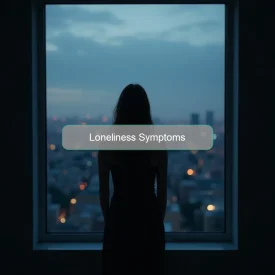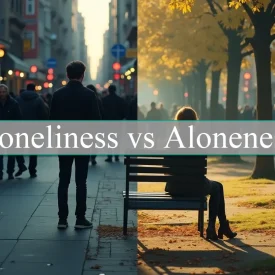Loneliness is a common yet deeply personal experience. While everyone feels alone sometimes, persistent loneliness can affect your emotional health, relationships, and even physical well-being.
Taking a simple loneliness test can help you reflect on your feelings, spot warning signs, and decide whether you may need more social support or professional help.
If you find yourself wondering, “Am I lonely?” this article and the loneliness test below can help you better understand your feelings. Taking a simple loneliness test can help you reflect on your emotions, spot warning signs, and decide whether you may need more social support or professional help
Key Takeaways
- A loneliness test helps you reflect on your social connections and emotional well-being without labeling or diagnosing you.
- The self-check quiz offers quick insights into how often you experience feelings of isolation or connection.
- Your score reveals patterns—from low signs of loneliness to high levels that may need more attention or support.
- Coping strategies such as building friendships, taking small social steps, and practicing mindfulness can reduce loneliness.
- Seeking professional help is valuable if loneliness is linked to anxiety, depression, or persistent emotional struggles.
When I first took a loneliness test after moving to a new city, I was surprised by my results. I thought I was doing fine because I stayed busy with work, but the test showed me how disconnected I felt beneath the surface.
Seeing it in numbers gave me the push I needed to reach out more and rebuild my social circle. That small step—acknowledging my feelings—helped me realize I wasn’t alone in feeling lonely.
Why Take a Loneliness Test?

The test helps you notice whether you feel close to other people or if you often feel alone or apart from others. Knowing this can help you decide if there’s something you want to change.
How Loneliness Tests Work
Most loneliness tests ask questions about how you usually feel, what you do, and whether you feel part of a group or like you don’t belong. You give answers that show how often you have these feelings, and then you get a score that shows how lonely you might be.
The test points out patterns in how you feel day to day, which can be hard to see on your own.
Common Types of Loneliness Tests
There are several formats in which loneliness tests are presented. These include:
- Psychological scales, such as the widely recognized UCLA Loneliness Scale, have been extensively validated in clinical research.
- Online self-check quizzes, like the one provided below, which offer quick insights and encourage self-reflection.
- Clinical assessments conducted by mental health professionals provide a more comprehensive evaluation and often accompany therapy or counseling sessions.
- Together, these types offer flexibility depending on how deeply you want to explore your feelings and whether you’re seeking professional support or simply a personal check-in.
Loneliness Self-Check Quiz
Disclaimer: This quiz is for informational purposes only and does not replace professional medical advice. If you feel persistent or severe loneliness, please consider speaking with a mental health professional.

Instructions
For each statement, choose how often it applies to you:
- Never (0)
- Rarely (1)
- Sometimes (2)
- Often (3)
- Always (4)
Write down your score for each question and total it at the end.
Questions
- I feel like I lack meaningful conversations in my daily life.
- I spend time with people, but still feel disconnected.
- I avoid social events because I fear feeling out of place.
- I wish I had someone to talk to when I’m stressed.
- I feel left out when I see others socializing without me.
- I often use my phone, social media, or TV to distract myself from loneliness.
- I struggle to maintain friendships or connections over time.
- I feel unseen or unnoticed, even around people I know.
- I long for deeper connections but don’t know how to create them.
- I worry that I don’t really have anyone I can rely on.
Scoring
- 0–10 points: Low signs of loneliness
Your social support seems healthy, though occasional loneliness is normal.
- 11–20 points: Mild loneliness
You may feel isolated sometimes; building stronger connections could help.
- 21–30 points: Moderate loneliness
Loneliness may be affecting your well-being; intentional steps can help.
- 31–40 points: High loneliness
Persistent loneliness may be impacting you; consider seeking professional support.
How to Interpret Your Loneliness Test Results

Understanding what your score means can clarify whether loneliness is a brief phase or a more persistent challenge. High scores usually indicate that loneliness is a frequent and significant part of your daily life. This may affect your mood, motivation, and overall outlook.
On the other hand, low scores typically suggest that you have meaningful social interactions and networks that support your well-being, though everyone experiences loneliness occasionally.
It’s also important to recognize when loneliness might be linked to deeper emotional issues such as anxiety, depression, or feelings of hopelessness. In such cases, loneliness is often part of a broader mental health picture, and professional help becomes crucial.
Recognizing the connection between your test results and these emotional states could be life-changing, helping you avoid isolation and find the right support.
Coping Strategies If You Score High on the Loneliness Test

If you find loneliness is a challenge for you, don’t worry—there are simple things you can do to feel better and more connected. Here are some ideas that can help you build your social life and feel less alone.
For more practical tips and proven ways to cope, see our detailed guide on dealing with loneliness.
Build Stronger Friendships
Making and keeping friends is one of the best ways to fight loneliness. Try joining groups or clubs, or take part in community activities that interest you. Sharing activities with others gives you a natural way to meet people and develop friendships. Even casual chats can lead to stronger bonds over time.
Take Small Social Steps to Boost Confidence
Sometimes the hardest part is simply getting started. If you feel shy or nervous, begin with small steps. This might be greeting a neighbor, asking a co-worker how their day is, or staying at a social event for a short while at first. Doing little things like this regularly can build your confidence for bigger social moments.
Practice Kindness Toward Yourself
Feeling lonely can make you feel down or frustrated with yourself. Instead of being hard on yourself, try treating yourself with the same kindness you would offer a friend. Mindfulness can help you notice your feelings without judging them. Reminding yourself that loneliness happens to everyone sometimes can reduce the sting and help you feel steadier.
Seek Support from a Counselor or Therapist
If loneliness feels too big to handle alone, getting help from a professional can make a big difference. Therapists and counselors provide a safe place to talk about what you’re feeling and offer advice on how to build social connections. They can also help if loneliness is linked to other challenges like anxiety or sadness.
The Role of AI Companions
For some people, loneliness does not just come from a lack of social opportunities but from difficulty establishing or maintaining close relationships. In these cases, technology can offer new and supportive options to feel connected.
One growing option is an AI girlfriend, a form of companionship powered by artificial intelligence. If you’re curious about what companionship through AI means or wonder “What is an AI girlfriend,” you can explore this emerging concept.
AI companions provide conversational support, engagement, and even emotional interaction, which some find helpful alongside traditional social connections.
Understanding the Value of Loneliness Tests
A loneliness test is not meant to label you or define your worth. Instead, it serves as a helpful tool to raise your awareness about your feelings of connection or isolation. Whether your results show low or high levels of loneliness, it’s important to use this information as a starting point for reflection.
By understanding your social well-being better, you can make informed decisions about nurturing relationships, seeking support, or making positive changes in your life.
Taking time to check in with yourself regularly can promote healthier, more satisfying social connections and improve your overall emotional health.
Frequently Asked Questions
Are Loneliness Tests Accurate?
They can highlight your level of loneliness, but are not diagnostic tools.
Can a Loneliness Test Diagnose Depression?
No. It only measures perceived loneliness, not depression or other conditions.
How Often Should You Take a Loneliness Test?
Checking in every few months can help track changes in your emotional well-being.






